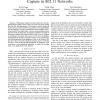Free Online Productivity Tools
i2Speak
i2Symbol
i2OCR
iTex2Img
iWeb2Print
iWeb2Shot
i2Type
iPdf2Split
iPdf2Merge
i2Bopomofo
i2Arabic
i2Style
i2Image
i2PDF
iLatex2Rtf
Sci2ools
102
click to vote
INFOCOM
2006
IEEE
2006
IEEE
A General Model and Analysis of Physical Layer Capture in 802.11 Networks
Abstract— While packet capture has been observed in real implementations of 802.11 devices, there is a lack of accurate models that describe the phenomenon. We present a general analytical model and an iterative method that predicts error probabilities and throughputs of packet transmissions with multiple senderreceiver pairs. Our model offers a more accurate prediction than previous work by taking into account the cumulative strength of interference signals and using the BER model to convert a signal to interference and noise ratio value to a bit error probability. This permits the analysis of packet reception at any transmission rate with interference from neighbors at any set of locations. We also prove that our iterative method converges, and we verify the accuracy of our model through simulations in Qualnet. Last, we present a rate assignment algorithm to reduce the average delay as an application of our analysis.
Related Content
| Added | 11 Jun 2010 |
| Updated | 11 Jun 2010 |
| Type | Conference |
| Year | 2006 |
| Where | INFOCOM |
| Authors | Hoon Chang, Vishal Misra, Dan Rubenstein |
Comments (0)

